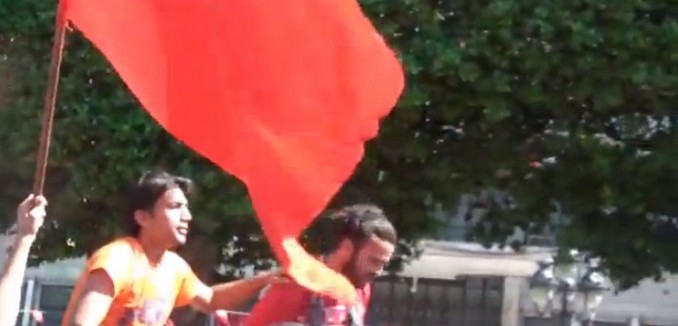Turmoil in Tunisia is threatening to further strain optimism originally engendered by the Arab Spring, after Egypt’s post-Spring Islamist government was overthrown in the wake of the largest national anti-government protests in human history.
Like Egypt, Tunisia’s post-Spring government was led by Islamists. Like Egypt, that coalition is falling apart. The current crisis began with the assassination of an opposition politician:
A secular party in Tunisia’s ruling Islamist-led coalition demanded a unity government on Monday to defuse a deepening political crisis, hours after the army sealed a square in the capital where protesters had clashed. Tensions have been mounting over opposition efforts to oust the government following last week’s assassination of a leftist politician, the second such killing in six months.
The New York Times reported last week on the broader climate, linking it to events in Egypt:
The assassination has hit Tunisia at a moment of growing political tension. Two years after the revolution that ended the dictatorship of President Zine el-Abidine Ben Ali and empowered Ennahda in parliamentary elections, opposition to the Islamists has been building. Leftist and democratic parties have accused it of inefficiency and of prolonging its mandate illegally.
Invigorated by events that overthrew the Islamist government in Egypt three weeks ago, they have increasingly demanded that the government resign and set a date for elections. Youth groups, including a Tunisian version of Egypt’s Tamarrod, or Rebellion, which was instrumental in the ouster of Egypt’s Islamist president, Mohamed Morsi, have begun organizing.
Events started unfolding at the end of last week:
We discuss the second murder of an opposition leader in #Tunisia w/ Ikbel Achour, senior research scientist and Tunisian. #worldview @WBEZ
– WBEZ Worldview (@WBEZWorldview) July 26, 2013
“Muhammad Brahmi did many things to criticize the government,” says Achour of the opposition leader. #worldview @WBEZ #Tunisia – WBEZ Worldview (@WBEZWorldview) July 26, 2013
“Everybody is willing and happy to say that the #Ennahda party is definitely involved,” says Achour. #Tunisia #worldview @WBEZ – WBEZ Worldview (@WBEZWorldview) July 26, 2013
Tunisians hold the government responsible for the murder of Brahmi and opposition leader Chokri Belaid” Achour says. #worldview #Tunisia
– WBEZ Worldview (@WBEZWorldview) July 26, 2013
Tunisia’s largest trade union – which was part of the protest movement that brought down then-President Zine al-Abidine Ben Ali at the beginning of the Arab Spring – protested the killing.
Turmoil in Tunisia is threatening to further strain optimism originally engendered by the Arab Spring, after Egypt’s post-Spring Islamist government was overthrown in the wake of the largest national anti-government protests in human history.
[Photo: Sofia Souza / YouTube]




